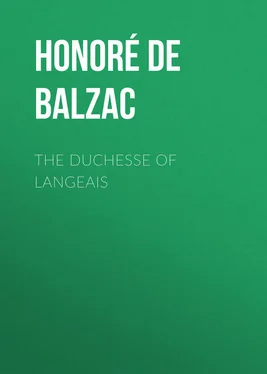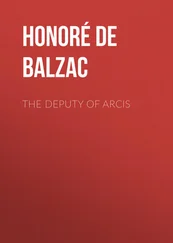Honoré Balzac - The Duchesse of Langeais
Здесь есть возможность читать онлайн «Honoré Balzac - The Duchesse of Langeais» — ознакомительный отрывок электронной книги совершенно бесплатно, а после прочтения отрывка купить полную версию. В некоторых случаях можно слушать аудио, скачать через торрент в формате fb2 и присутствует краткое содержание. Жанр: literature_19, foreign_antique, foreign_prose, на английском языке. Описание произведения, (предисловие) а так же отзывы посетителей доступны на портале библиотеки ЛибКат.
- Название:The Duchesse of Langeais
- Автор:
- Жанр:
- Год:неизвестен
- ISBN:нет данных
- Рейтинг книги:3 / 5. Голосов: 1
-
Избранное:Добавить в избранное
- Отзывы:
-
Ваша оценка:
- 60
- 1
- 2
- 3
- 4
- 5
The Duchesse of Langeais: краткое содержание, описание и аннотация
Предлагаем к чтению аннотацию, описание, краткое содержание или предисловие (зависит от того, что написал сам автор книги «The Duchesse of Langeais»). Если вы не нашли необходимую информацию о книге — напишите в комментариях, мы постараемся отыскать её.
The Duchesse of Langeais — читать онлайн ознакомительный отрывок
Ниже представлен текст книги, разбитый по страницам. Система сохранения места последней прочитанной страницы, позволяет с удобством читать онлайн бесплатно книгу «The Duchesse of Langeais», без необходимости каждый раз заново искать на чём Вы остановились. Поставьте закладку, и сможете в любой момент перейти на страницу, на которой закончили чтение.
Интервал:
Закладка:
An hour after the General landed on the island, the royal authority was re-established there. Some few Constitutional Spaniards who had found their way thither after the fall of Cadiz were allowed to charter a vessel and sail for London. So there was neither resistance nor reaction. But the change of government could not be effected in the little town without a mass, at which the two divisions under the General’s command were obliged to be present. Now, it was upon this mass that the General had built his hopes of gaining some information as to the sisters in the convent; he was quite unaware how absolutely the Carmelites were cut off from the world; but he knew that there might be among them one whom he held dearer than life, dearer than honour.
His hopes were cruelly dashed at once. Mass, it is true, was celebrated in state. In honour of such a solemnity, the curtains which always hid the choir were drawn back to display its riches, its valuable paintings and shrines so bright with gems that they eclipsed the glories of the ex-votos of gold and silver hung up by sailors of the port on the columns in the nave. But all the nuns had taken refuge in the organ-loft. And yet, in spite of this first check, during this very mass of thanksgiving, the most intimately thrilling drama that ever set a man’s heart beating opened out widely before him.
The sister who played the organ aroused such intense enthusiasm, that not a single man regretted that he had come to the service. Even the men in the ranks were delighted, and the officers were in ecstasy. As for the General, he was seemingly calm and indifferent. The sensations stirred in him as the sister played one piece after another belong to the small number of things which it is not lawful to utter; words are powerless to express them; like death, God, eternity, they can only be realised through their one point of contact with humanity. Strangely enough, the organ music seemed to belong to the school of Rossini, the musician who brings most human passion into his art.
Some day his works, by their number and extent, will receive the reverence due to the Homer of music. From among all the scores that we owe to his great genius, the nun seemed to have chosen Moses in Egypt for special study, doubtless because the spirit of sacred music finds therein its supreme expression. Perhaps the soul of the great musician, so gloriously known to Europe, and the soul of this unknown executant had met in the intuitive apprehension of the same poetry. So at least thought two dilettanti officers who must have missed the Theatre Favart in Spain.
At last in the Te Deum no one could fail to discern a French soul in the sudden change that came over the music. Joy for the victory of the Most Christian King evidently stirred this nun’s heart to the depths. She was a Frenchwoman beyond mistake. Soon the love of country shone out, breaking forth like shafts of light from the fugue, as the sister introduced variations with all a Parisienne’s fastidious taste, and blended vague suggestions of our grandest national airs with her music. A Spaniard’s fingers would not have brought this warmth into a graceful tribute paid to the victorious arms of France. The musician’s nationality was revealed.
“We find France everywhere, it seems,” said one of the men.
The General had left the church during the Te Deum ; he could not listen any longer. The nun’s music had been a revelation of a woman loved to frenzy; a woman so carefully hidden from the world’s eyes, so deeply buried in the bosom of the Church, that hitherto the most ingenious and persistent efforts made by men who brought great influence and unusual powers to bear upon the search had failed to find her. The suspicion aroused in the General’s heart became all but a certainty with the vague reminiscence of a sad, delicious melody, the air of Fleuve du Tage . The woman he loved had played the prelude to the ballad in a boudoir in Paris, how often! and now this nun had chosen the song to express an exile’s longing, amid the joy of those that triumphed. Terrible sensation! To hope for the resurrection of a lost love, to find her only to know that she was lost, to catch a mysterious glimpse of her after five years – five years, in which the pent-up passion, chafing in an empty life, had grown the mightier for every fruitless effort to satisfy it!
Who has not known, at least once in his life, what it is to lose some precious thing; and after hunting through his papers, ransacking his memory, and turning his house upside down; after one or two days spent in vain search, and hope, and despair; after a prodigious expenditure of the liveliest irritation of soul, who has not known the ineffable pleasure of finding that all-important nothing which had come to be a king of monomania? Very good. Now, spread that fury of search over five years; put a woman, put a heart, put love in the place of the trifle; transpose the monomania into the key of high passion; and, furthermore, let the seeker be a man of ardent temper, with a lion’s heart and a leonine head and mane, a man to inspire awe and fear in those who come in contact with him – realise this, and you may, perhaps, understand why the General walked abruptly out of the church when the first notes of a ballad, which he used to hear with a rapture of delight in a gilt-paneled boudoir, began to vibrate along the aisles of the church in the sea.
The General walked away down the steep street which led to the port, and only stopped when he could not hear the deep notes of the organ. Unable to think of anything but the love which broke out in volcanic eruption, filling his heart with fire, he only knew that the Te Deum was over when the Spanish congregation came pouring out of the church. Feeling that his behaviour and attitude might seem ridiculous, he went back to head the procession, telling the alcalde and the governor that, feeling suddenly faint, he had gone out into the air. Casting about for a plea for prolonging his stay, it at once occurred to him to make the most of this excuse, framed on the spur of the moment. He declined, on a plea of increasing indisposition, to preside at the banquet given by the town to the French officers, betook himself to his bed, and sent a message to the Major-General, to the effect that temporary illness obliged him to leave the Colonel in command of the troops for the time being. This commonplace but very plausible stratagem relieved him of all responsibility for the time necessary to carry out his plans. The General, nothing if not “catholic and monarchical,” took occasion to inform himself of the hours of the services, and manifested the greatest zeal for the performance of his religious duties, piety which caused no remark in Spain.
The very next day, while the division was marching out of the town, the General went to the convent to be present at vespers. He found an empty church. The townsfolk, devout though they were, had all gone down to the quay to watch the embarkation of the troops. He felt glad to be the only man there. He tramped noisily up the nave, clanking his spurs till the vaulted roof rang with the sound; he coughed, he talked aloud to himself to let the nuns know, and more particularly to let the organist know that if the troops were gone, one Frenchman was left behind. Was this singular warning heard and understood? He thought so. It seemed to him that in the Magnificat the organ made response which was borne to him on the vibrating air. The nun’s spirit found wings in music and fled towards him, throbbing with the rhythmical pulse of the sounds. Then, in all its might, the music burst forth and filled the church with warmth. The Song of Joy set apart in the sublime liturgy of Latin Christianity to express the exaltation of the soul in the presence of the glory of the ever-living God, became the utterance of a heart almost terrified by its gladness in the presence of the glory of a mortal love; a love that yet lived, a love that had risen to trouble her even beyond the grave in which the nun is laid, that she may rise again as the bride of Christ.
Читать дальшеИнтервал:
Закладка:
Похожие книги на «The Duchesse of Langeais»
Представляем Вашему вниманию похожие книги на «The Duchesse of Langeais» списком для выбора. Мы отобрали схожую по названию и смыслу литературу в надежде предоставить читателям больше вариантов отыскать новые, интересные, ещё непрочитанные произведения.
Обсуждение, отзывы о книге «The Duchesse of Langeais» и просто собственные мнения читателей. Оставьте ваши комментарии, напишите, что Вы думаете о произведении, его смысле или главных героях. Укажите что конкретно понравилось, а что нет, и почему Вы так считаете.












